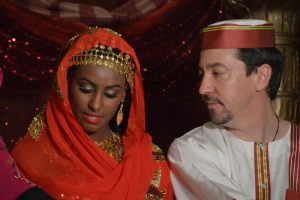The Shihad frontman, who also leads side project The Adults, worked on this band’s second album Haja to explore the music of the northern Sudanese people as part of his master’s research. Haja is a respectful term for an older, experienced Sudanese woman.
The recording of the album itself – a celebration of the Sudanese music performed by women called Aghani-Al-Banat, interweaved with the music and lyrics of some of New Zealand’s rising stars – also formed part of his research project.
His master’s supervisor, Dr Oli Wilson, and the album’s producer, Devin Abrams, are both senior lecturers at Massey’s School of Music and Creative Media Production. Both are also practising musicians, working as keyboardists in The Chills and Pacific Heights (a solo project for Abrams) respectively.
Toogood met wife Dana, the daughter of a former United Nations diplomat, at an event at the Auckland War Memorial Museum and ended up visiting her northern Sudan homeland and converting to Islam. He also fell in love with what he describes as the country’s “organic dance music”.
Toogood was first exposed to Aghani-Al-Banat during his wife’s wedding dance on the third day of his traditional Sudanese wedding ceremony in Khartoum. The melodic mix of percussion and vocals reminded him of punk and hip-hop music, and he was keen to use it with some bass lines of his own. Aghani-Al-Banat, which roughly translates as “girl’s music”, is considered low-class in Sudan.
“I initially recorded renditions of my wife’s wedding dance on an iPhone. I then went into a recording studio to work on it, but because of the nature of this form of music in Sudanese society, it’s not seen as a recorded form of music, it’s music that’s performed live, so we hit a few road blocks,” he says.
“Both the artists and the recording engineers were uncomfortable. Because they were uncomfortable, the recordings and performances weren’t as good [as the live performance], so I went back to the original iPhone recordings where the performance was on fire.
“It was a mono-compressed digital file. How do you make that presentable to people in the West who want to hear things in high fidelity, and sonically are used to hearing at a certain standard? All of the instruments I recorded over the top were recorded using high-quality gear, but the mono files of the women sat in the middle of the mix really beautifully, and I could build up a sonically superior landscape around it.
“However, I did really need Devin’s skills to make that work,” Toogood says. “I knew I needed someone who came from the dance music world to articulate what I was hearing.”
At the same time Toogood was recording music and enlisting the support of some of New Zealand’s up-and-coming artists for the album, such as songstress Chelsea Jade, rapper Raiza Biza and hip-hop artist Kingz, he was also researching the cultural influences of where the music originated.
Toogood concedes the theoretical learning process was a bit of an adjustment after nearly 30 years as a working musician and, by his own admission, being a less-thandiligent student at Wellington High School.
“Coming from a New Zealand workingclass background and marrying into [an upper-middle-class] family where the mother would not want her daughter playing Sudanese music like Aghani-AlBanat is a bit jarring. But it made me love it even more. I’ve always liked music to have a voice for those people who don’t have a voice.”
